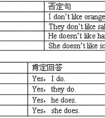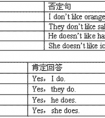句型转换。1.We were happy yesterday.(同义句)We_____________yesterday.2.Amy has 5pencils. Simon has 6 pencils.(合并成一句)Amy has ______pencils______Simon.-八年级英语
它在句中作宾语,不能省略,否则该句是一个意义不完整的错句。例如:
(1)Jane is too young to look after herself.(简年纪太小,以至于不能照看自己)
(2)I teach myself English.(我自学英语)
(3)He didn't hurt himself, thank goodness.(他未伤了他自己,谢天谢地。)
B.强调用法
反身代词在强调用法中表示强调,即用来加强某个名词或者代词的语气,可译成“亲自”、“本人”。
此时,它在句中作同位语。即使去掉,也不影响句子的完整性。例如:
(1)You must do it yourself.(你必须自己做)
(2)I myself did the homework last night。(昨晚是我自己做了家庭作业)
C.与by搭配
当反身代词与by搭配时,意为:单独地,没有人帮助的。例如:
(1)We must finish it all by ourselves.(我们必须全靠自己去完成。)
(2)He can swim all by himself.(他能独自一个人游泳。)
D.宾语转换为主语一定要记牢有些形容词需有反身代词
Please help yourself to some fish. 请你随便吃点鱼。
We enjoyed ourselves last night. 我们昨晚玩得很开心。
E.用于及物动词+宾语+介词
take pride in, be annoyed with, help oneself to sth.
I could not dress (myself) up at that time. 那个时候我不能打扮我自己。
F.注意:有些动词后不跟反身代词,get up,sit down ,wake up等。
注:反身代词和人称代词作宾语时具有不同的含义。如:
He saw himself in the mirror.他在镜子里看见了他自己。(himself 和 he 为同一人)
He saw him in the mirror.他在镜子里看见了他。(him 显然指另外一人)
2、作表语,此时的表语指的就是主语。可用在be,feel,seem,look等系动词之后,通常描述身体、精神等方面的感觉或状态。例如:
After a few days of rest,he was more himself again.
休息几天之后,他的身体好多了。
She does't look herself today.
她今天看上去神色不正常。
I am not myself today.
我今天不舒服。
3、作同位语,用来加强语气或表示强调,可译为“亲自”,“本人”。如果省去反身代词,句子含义也不会有实质性的改变。
这样用时,反身代词在句中的位置比较灵活,如果是做主语的同位语,可以紧跟在该名词或代词的后面,也可置于句末。
The thing itself is not important. 翻译:事情本身并不重要。
4、在不强调的情况下,but, except, for 等介词后宾语用反身代词或人称代词宾格均可。如:
No one but myself (me) is hurt.
5、作主语
反身代词本身不能单独作主语。
(错)Myself drove the car.
(对)I myself drove the car. 我自己开车。
但在and, or, nor连接的并列主语中,第二个主语可用反身代词,特别是myself 作主语。
例如:Charles and myself saw it.
反身代词不能做主语,但可以放在主语后或句末。
例如:I did it by myself.
|
单数 |
复数 | |
|
第一人称 |
myself |
ourselves |
|
第二人称 |
yourself |
yourselves |
|
第三人称 |
himself |
themselves |
考点名称:形容词的比较级,形容词的最高级
- 形容词的比较级:
当两种物体之间相互比较时,我们要用形容词或副词的比较级;
当相互比较的物体是三个或三个以上时,我们就要用形容词或副词的最高级。 形容词的比较级和最高级的特殊变化规则:
一、少数单音节词前面加 more-, most- 构成比较级和最高级
tired ---- more tired , most tired
fond ----- more fond , most fond
glad ----- more glad , most glad
bored ---- more bored , most bored
pleased---- more pleased , most pleased二、不规则变化
good /well------- better ,best
bad/badly/ill------ worse , worst
many/much-------more , most
little ------ less , least
far ---- farther, farthes / firther , furthest
old ---- older , oldest (GA)
---- older , oldest / elder , eldest (GB)三、下列形容词和副词的比较级和最高级有两种形式
cruel----- crueler, cruelest /more cruel , most cruel
strict---- stricter , strictest /more strict , most strict
often----- oftener , oftenest / more often , most often
friendly------ friendlier , friendliest / more friendly , most friendly
clever----- cleverer, cleverest / more clever , most clever四、下列形容词和副词没有比较级和最高(即表示”最高程度”或”绝对状态”的形容词和副词没有比较级和最高级)
empty , wrong , perfect , unique , extreme , excellent , favourite (GB)/ favorite (GA) , true , right , correct , extremely ...- 形容词的比较级和最高级用法:
形容词比较等级用法:
1.没有比较对象时,用原级。
I have a new computer.
2.两者比较,程度相同。
A+系动词+as+adj.+as+B.
Our school is as beautiful as theirs.
3.两者比较,程度不同。
A+系动词+not as+adj.+as+B.
The weather here is not as hot as that in the south.
4.A比B更…
The earth is bigger than the moon.
5.比较级前可以用much,even,still,far,a lot,a little,a bit,any等修饰。
Your room is much bigger than mine.
I’m a little shorter than her.
6.用比较级可以表示最高级含义:
John is stronger than any other boy in his class.=John is stronger than any of the other boys.
两者不属于同一范畴,不能用other.
Chongqing is bigger than any city in Sichuang.
7.“比较级+and+比较级” 表示“越来越…”
China is becoming more and more beautiful.
Days are getting longer and longer.
8.用the+比较级,the+比较级 表示”越…就越…”.
The busier he is, the happier he feels.
9. Which/Who+is+比较级 A或B?
A和B哪一个/谁更…?
Which is better,this one or that one?
最高级用法:
表示三者或三者以上的人或物的比较,一个在某方面超过其他两个或多个时,用最高级,结构是
主语+系动词+the+形容词最高级+of/in短语。
This story is the most interesting of the three.
1. one of the+形容词最高级+名词复数
它的意思是最…之一。
English is one of the most important languages in the world.
2. which/who…+is+形容词最高级
“…最...”
Which is the heaviest,the horse,the sheep or the elephant?
3.最高级前可以用序数词
The Yellow River is the second longest river in China. - 形容词的比较级和最高级的变化规则:


![How much does it ______ to fly from Yancheng to Hainan Island?[ ]A. cost B. payC. spend D. take-七年级英语](http://www.00-edu.com/d/file/ks/4/2/shiyidongci/2020-01-05/small7dcf2f05998de63e10cc3629787031c81578210087.png)

![He always _____TV in the evening. He _____ listening to the radio. [ ]A. watch, don't like B. watches, doesn't like C. watching, don't like D. watch, do-七年级英语](http://www.00-edu.com/d/file/ks/4/2/shiyidongci/2020-01-05/small45d599b4a60b84e61cec210bfbf051f51578214524.png)
![I'd rather ___ to the Mcdonald's Restaurant because I like to listen to quiet music.[ ]A. to go B. going C. go D. went-八年级英语](http://www.00-edu.com/d/file/ks/4/2/shiyidongci/2020-01-05/small1767bba1727fef2c035c53dcbd9bc20e1578209517.png)
